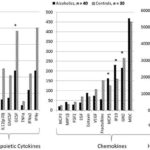Tag Archives:inflammation
Aorta tertiary lymphoid organs: Powerhouses of B cell immunity in atherosclerosis
Inflammation alters brain function and pain processing centrally
Modulation of SOCS3 in macrophages can enhance the clearance of dying cells in inflammation
Immunological disturbances observed in chronic alcoholism
Can Radon radiation become a source of treatment for Rheumatoid Arthritis?
Orphans and inflammation
Many are now well-aware of the negative impact of inflammation on our health, including cancer as well as rheumatologic, metabolic and neurologic disorders. Insults to the body either through injury (acute or chronic), or poor diet can
微调的炎症是成功的关键limb regeneration
HIV/AIDS-associated tryptophan depletion as part of the influence of inflammatory mediators on general nutritional status
The essential amino acid tryptophan cannot be synthesised in the body and must be acquired through dietary intake. Tryptophan is an important substrate for protein synthesis and for synthesis of the neuroactive substances serotonin, melatonin and tryptamine.
The inflamed skin in atopic eczema contributes to the disrupted skin-barrier
The many faces of macrophages in lung cancer
ATF3-dependent cross-talk between cardiomyocytes and macrophages promotes cardiac maladaptive remodeling
Cardiovascular diseases are disorders of the heart and blood vessels which are leading to heart failure. Cardiovascular diseases correspond to 30% of all deaths in the world. The molecular processes that undergone from a healthy heart to





















